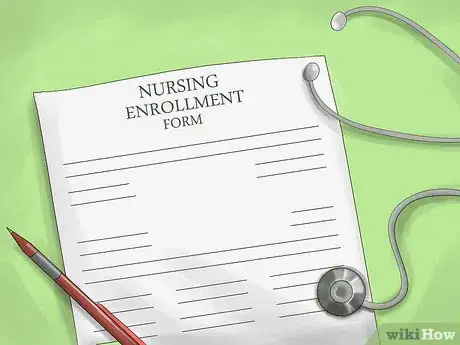This article was co-authored by Julie Matheney, MS, CCC-SLP, CLEC, IBCLC. Julie Matheney is an International board certified Lactation Consultant (IBCLC) and the Founder of The LA Lactation Lady, her lactation consulting business based in Los Angeles, California. She has over eight years of lactation consulting experience. She earned her MS in Speech-Language Pathology from Miami University and has earned a Certificate of Clinical Competence for Speech-Language Pathologists (CCC-SLP). She also earned her Certified Lactation Educator Counselor (CLEC) certificate from the University of California, San Diego.
There are 9 references cited in this article, which can be found at the bottom of the page.
wikiHow marks an article as reader-approved once it receives enough positive feedback. In this case, 100% of readers who voted found the article helpful, earning it our reader-approved status.
This article has been viewed 130,203 times.
The practice of breastfeeding is a natural part of being a mother, but it takes skill and using the proper technique to do it successfully. That's where lactation consultants come in. Lactation consultants are trained to help new mothers prevent and solve problems with breastfeeding, and with breastfeeding on the rise, the profession is growing every year. To become a lactation consultant, it is necessary to get certified by the International Board of Lactation Consultant Examiners (IBLCE). Once you receive certification, you may work with a hospital or health clinic as a certified consultant. Read on to learn more about the process.
Steps
Meeting the Educational Requirements
-
1Meet the requirements of a health sciences education program. Most health professional must study and complete an education program in health science, which involves 14 subjects described in the IBLCE's Health Sciences Education Guide. They include nutrition, biology, anatomy, psychology, and other subjects.[1]
- If you are already a Registered Nurse or another health professional recognized by the IBLCE, you can demonstrate your completion of health sciences education by submitting copies of your license, registration, transcript, and degree to the IBLCE with your application materials.
- If you are not already a health professional, enrolling in a nursing program is the best way to obtain the education you need to become a lactation consultant.[2]
- If you prefer not to enroll in a nursing program, you will need to complete the following college and continuing education courses:
- Biology
- Human Anatomy
- Human Physiology
- Infant and Child Growth and Development
- Nutrition
- Psychology or Counseling or Communication Skills
- Introduction to Research
- Sociology or Cultural Sensitivity or Cultural Anthropology
- Basic life support (for example, CPR)
- Medical documentation
- Medical terminology
- Occupational safety and security for health professionals
- Professional ethics for health professionals
- Universal safety precautions and infection control
- Alternatively, you could also become a La Leche Leader for the La Leche League, a volunteer program in which experienced breastfeeders help other women learn how to breastfeed.[3]
EXPERT TIPJulie Matheney is an International board certified Lactation Consultant (IBCLC) and the Founder of The LA Lactation Lady, her lactation consulting business based in Los Angeles, California. She has over eight years of lactation consulting experience. She earned her MS in Speech-Language Pathology from Miami University and has earned a Certificate of Clinical Competence for Speech-Language Pathologists (CCC-SLP). She also earned her Certified Lactation Educator Counselor (CLEC) certificate from the University of California, San Diego.International Board Certified Lactation Consultant
 Julie Matheney, MS, CCC-SLP, CLEC, IBCLC
Julie Matheney, MS, CCC-SLP, CLEC, IBCLC
International Board Certified Lactation ConsultantDid You Know? If you want to be a lactation consultant, the most important trait you can have is to be a good listener. Often, parents don't know what problem they're having, but you can help them figure it out just by listening. Also, you need to be able to communicate what the parents need to know in a concise manner, while still being encouraging, compassionate, and nonjudgmental.
-
2Get Lactation Specific Clinical Experience. This means experience providing lactation assistance to pregnant and breastfeeding women and educating families under supervision. Contact IBLCE to find an approved program you can participate in to complete this requirement.[4]
- You must have experience in consulting with women from pre-conception all the way through the weaning process.
- The IBLCE exam will test your knowledge of clinical skills you have mastered.
- Depending on what pathway you choose, you will need from 300 to 1,000 hours of Lactation Specific Clinical Experience in order to sit for the IBLCE exam. clinic hours must have taken place in the 5 years prior to the exam.
Advertisement -
3Complete Lactation Specific Education. You will need to sign up for a Lactation Education program and complete 90 hours of coursework in order to be permitted to sit for the IBLCE exam. The coursework covers the history of lactation consulting and many disciplines related to breastfeeding.[5]
- Find a program that is meant to prepare you for the IBLCE Exam Blueprint. Since the IBLCE does not recommend any particular program, it's important to find one that is reputable and has adequately prepared people to take and pass the exam.
- The Lactation Specific Education must have been completed within the 5 years prior to the exam.
Picking a Pathway to Certification
-
1Choose the path of recognized health professionals. If you are already a health professional and have taken the necessary coursework involved in Health Sciences Education, you may choose this pathway to eligibility for the IBLCE exam. Requirements include:[6]
- 1,000 hours of lactation specific clinical practice supervised by someone familiar with breastfeeding. The hours must be conducted within the 5 years immediately prior to your exam.
- 90 hours of lactation specific education completed within the 5 years immediately prior to your exam.
-
2Choose the path of accredited academic programs. You may choose this path if you decide to enroll in an accredited program in order to complete your Health Sciences Education coursework, but you are a not a health professional. You must graduate from an academic program in human lactation and breastfeeding.[7] Requirements include:
- 300 hours of directly supervised lactation specific clinical practice (where "directly supervised" means supervision by a certified ICBLC. The hours must be conducted within the 5 years immediately prior to your exam.
- 90 hours of lactation specific education completed within the 5 years immediately prior to your exam.
-
3Choose the mentorship path. On this path, you work with an IBCLC who serves as your mentor during the process of completing your Health Sciences Education coursework. Be sure your mentor has been approved by the IBLCE before starting.[8] Requirements for this path include:
- 500 hours of directly supervised lactation specific clinical practice completed within the 5 years prior to your exam.
- 90 hours of lactation specific education completed within the 5 years prior to your exam.
Getting Certified
-
1Complete the application form and receive a test date. When you've fulfilled all of the requirements, complete the IBLCE application form. Return it to the IBLCE to set up an exam date.
- Pay the application fee when you send in the form. It ranges from $255 to $660, depending on what country you live in.
- Schedule a test date at a IBLCE testing center.
- The exam is given just twice a year, so be aware of the deadlines or you'll have to wait another 6 months before you can take the exam.[9]
-
2Pass the exam and receive certification. Once you take and pass the exam, you will become an ICBLC. This means you are certified to work as a lactation consultant at a hospital, at a health clinic, or in assistance to a midwife. You can also work on your own with individual mothers.
References
- ↑ https://iblce.org/wp-content/uploads/2018/08/candidate-information-guide-english.pdf
- ↑ http://www.breastfeedingbasics.com/qa/becoming-a-lactation-consultant
- ↑ http://www.lalecheleague.org/
- ↑ https://iblce.org/step-1-prepare-for-ibclc-certification/lactation-specific-clinical-experience/
- ↑ https://iblce.org/step-1-prepare-for-ibclc-certification/lactation-specific-education/
- ↑ https://iblce.org/step-1-prepare-for-ibclc-certification/lactation-specific-clinical-experience/pathway-1/
- ↑ https://iblce.org/step-1-prepare-for-ibclc-certification/lactation-specific-clinical-experience/pathway-2-accredited-academic-programs/
- ↑ https://iblce.org/step-1-prepare-for-ibclc-certification/lactation-specific-clinical-experience/pathway-3-mentorship/
- ↑ https://iblce.org/step-2-certification-fees-and-key-dates/
About This Article
To become a lactation consultant if you're already a licensed health professional, start by completing 1,000 hours of lactation specific clinical practice and 90 hours of lactation related education. Alternatively, if you're not a health professional, enroll in an academic program to complete the educational requirements, then complete 300 hours of lactation specific clinical practice. Once you finish the required education and training, sign up to take the International Board of Lactation Consultant Examiners certification exam, which will allow you to work as a lactation consultant. For more tips, like how to prepare for the certification exam, read on!

















































































